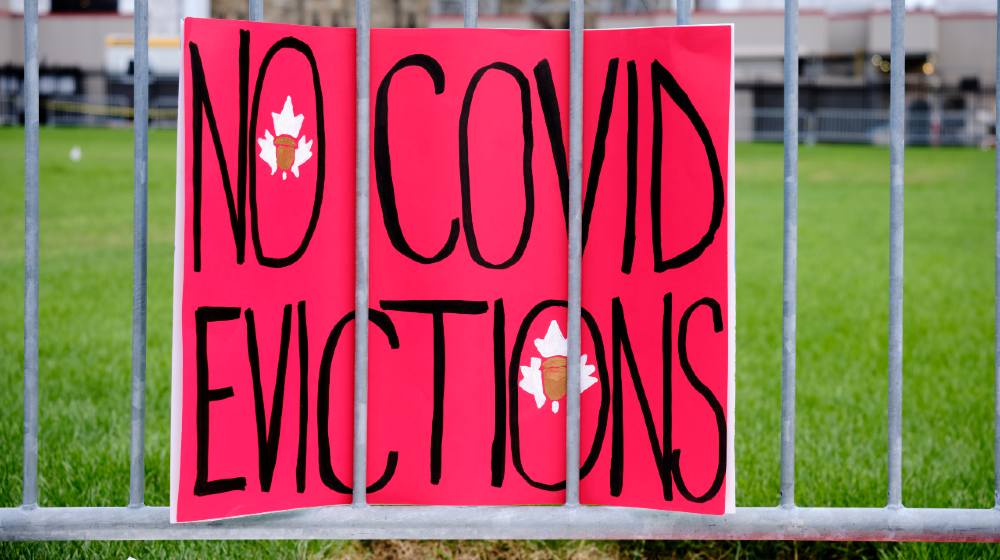Breaking News
White House Extends Eviction Moratorium

Last Monday, the US Centers for Disease Control and Prevention (CDC) announced the extension of the eviction moratorium until June 30. This provides a reprieve to millions of tenants that continue to fail to pay the rent due to the economic effects of the coronavirus. Without the extension, the rent moratorium would expire by March 31.
RELATED: Federal Eviction Moratorium May End Soon
Diane Yentel, president of the National Low Income Housing Coalition, said renters need time to catch up with rent payments. “The extended moratorium and its enforcement are essential to help millions of families remain in their homes,” she said. She added that states and local communities need time to distribute billions of dollars in emergency rental assistance. These are funds approved by Congress to help renters catch up.
Eviction Moratorium Helps Prevent the Spread of Coronavirus
According to the Census Bureau, more than 8 million American households fell behind on their rent payments. Earlier studies showed that evictions spread COVID-19 and result in more deaths, as people tend to move to crowded living situations. Allowing the CDC’s rent protection law to lapse can set off a wave of evictions.
According to CDC director Dr. Rochelle Walensky, the eviction moratorium extension can help prevent the spread of the disease. “The COVID-19 pandemic has presented a historic threat to the nation's public health. Keeping people in their homes and out of crowded or congregate settings, like homeless shelters, by preventing evictions is a key step in helping to stop the spread of COVID-19,” she remarked. In fact, many renters can now apply for federal rental assistance money, upwards of $50 billion. Government agencies started accepting applications through their web portals that opened last March.
Original Moratorium Signed by Trump Last Year
It was former President Donald Trump who issued the original executive order placing an eviction moratorium extension. Based on advice from the CDC, Trump issued an EO last September 4 calling for a moratorium on evictions for nonpayment of rent for tenants who meet certain eligibility criteria. Applicants must also submit a signed declaration of eligibility to their landlord.
However, the EO does not remove the landlord’s power to challenge tenant declarations or initiate eviction proceedings. But, any actual moving out or eviction can only occur after the moratorium expires. Trump’s original moratorium expired last January 1, 2021, but the former President extended the order until March 31. Then, President Joe Biden signed another extension yesterday, or two days before the expiration. This will remain in effect until June 30, 2021.
Landlord Groups Oppose the Extension
Landlord trade groups opposed the eviction moratorium. They said that as landlords, they need to stay in control of their properties. “Though politically popular and well-intentioned, eviction moratoria push renters and their housing providers closer to the brink of financial ruin,” said Bob Pinnegar, president and CEO of the National Apartment Association.
At the same time, legal aid attorneys helping renters facing evictions said that the CDC ordered contains too many loopholes. Among their chief complaints is that the moratorium isn’t automatic. Renters need to know about and they need to follow a process to gain the right to stay. They need to secure a form from the CDC website, sign it under penalty of perjury, and then give it to their landlord. However, landlords can invoke arguments that can nullify the moratorium. Among the examples of how to do so is stating that landlords do not wish to extend the lease contract, which expired during the moratorium. Unfortunately, these gray areas remain unaddressed by the CDC.
Many Landlords Remain Generous
Despite the many loopholes, many landlords followed the spirit of the law by holding off evictions. Shamus Roller, executive director of the National House Law Project, said the CDC’s efforts are lacking in substance. “The CDC did the bare minimum. And that will mean many more renters will lose their homes before the pandemic is over,” he noted.
With an improving economy, many renters can now catch up with their pending dues. The Census Bureau reported that there are 1.2 million fewer Americans lagging behind on their rent checks compared to last year.
Watch the KTNV Channel 13 Las Vegas report saying that eviction moratorium extension causing concern for landlords:
Do you agree that evictions should remain on hold until June this year? Or, have landlords been generous enough that it’s time to resume their business? Let us know what you think about rentals and the moratorium. Share your thoughts in the comment section below.












